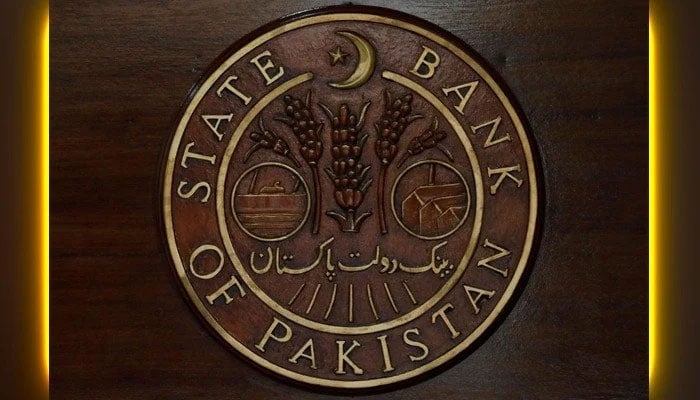SBP mulls issuing digital currency
Reza Baqir says the government was expected to announce further development on digital currency in the upcoming months.
KARACHI: The Bank of Pakistan (SBP) is examining issuing digital currency as a means of boosting financial inclusion as well as reducing money laundering from the economy, SBP governor said on Friday.
"We are studying that very carefully. We think that some countries like China are already showing the way,” governor Reza Baqir said at an interview with the CNN.
Baqir said that the introduction of an SBPs digital currency will have a twofold benefit.
“Not only does it gives a boost to our efforts for financial inclusion but second, because it is a central bank-issued digital currency it allows us to make further progress in our fight towards anti-money laundering, towards countering terrorism financing,” he said
“So we are at a stage where we are studying it.”
Governor said the government was expected to announce further development on digital currency in the upcoming months. “For now we have allowed a framework for digital banks to begin operation in Pakistan.” To a question regarding the entry of major global fintech including Stripe’s entry into the Pakistani market, Baqir said fintechs like Stripe and other such big international payment providers are ‘very welcome’ in Pakistan.
“Pakistan is a great potential market for all such companies as most of the population is tech-savvy and there is a budding youth potential in the technology sector of the economy.”
“We are very open and we embrace any global mobile payment operator that wants to come to Pakistan,” Baqir said talking to CNN.
“During Covid-19, the central bank did one thing to eliminate the fees on interbank transfer and the impact of these is phenomenal as in December 2020 we have a growth of about 150-200 percent, compared to a year ago, on mobile banking transactions,” he said.
Baqir said coronavirus pandemic was terrible for many countries but for Pakistan it was challenging because the population was poor.
Secondly he said the country had just started the IMF programme and the economy was already slowing down due to the stabilisation policies the government had to implement.
“When Covid came we had to be very quick on our feet. I would tell you on the public health dimension the government gave a quick response even right now as Pakistan was in the mid of third wave of Covid. Pakistan has about 18 cases per million that still compare to 187 cases per million in the USA. On the central bank side we have to be aggressive, flexible and targeted.” “We give support of five percent of GDP to the businesses they needed. We were flexible in the sense that we have revised our policies in response to feedback that we got from the business community.”
“Currently I estimate a roughly 3 percentage point rise in inflation over the past three months and about half of that is not under control of the monetary policy that is increasing electricity prices and because of the increase in food prices primarily commodities.”
“Interest rate is not controlled by either of these factors. The central bank has credibility to look through temporary increase in inflation that we are trying to do with clear communication and keeping a close eye on inflation expectations,” the governor said.
-
 Giant Tortoise Reintroduced To Island After Almost 200 Years
Giant Tortoise Reintroduced To Island After Almost 200 Years -
 Eric Dane Drops Raw Confession For Rebecca Gayheart In Final Interview
Eric Dane Drops Raw Confession For Rebecca Gayheart In Final Interview -
 Trump Announces New 10% Global Tariff After Supreme Court Setback
Trump Announces New 10% Global Tariff After Supreme Court Setback -
 Influencer Dies Days After Plastic Surgery: Are Cosmetic Procedures Really Safe?
Influencer Dies Days After Plastic Surgery: Are Cosmetic Procedures Really Safe? -
 Eric Dane Confesses Heartbreaking Regret About Daughters' Weddings Before Death
Eric Dane Confesses Heartbreaking Regret About Daughters' Weddings Before Death -
 Nicole 'Snooki' Polizzi Reveals Stage 1 Cervical Cancer Diagnosis
Nicole 'Snooki' Polizzi Reveals Stage 1 Cervical Cancer Diagnosis -
 Hilary Duff’s Son Roasts Her Outfit In New Album Interview
Hilary Duff’s Son Roasts Her Outfit In New Album Interview -
 Alexandra Daddario, Andrew Form Part Ways After 3 Years Of Marriage
Alexandra Daddario, Andrew Form Part Ways After 3 Years Of Marriage -
 Eric Dane Rejected Sex Symbol Label
Eric Dane Rejected Sex Symbol Label -
 Avan Jogia Says Life With Fiancee Halsey Feels Like 'coming Home'
Avan Jogia Says Life With Fiancee Halsey Feels Like 'coming Home' -
 Kate Middleton's Role In Handling Prince William And Harry Feud Revealed
Kate Middleton's Role In Handling Prince William And Harry Feud Revealed -
 Tucker Carlson Says Passport Seized, Staff Member Questioned At Israel Airport
Tucker Carlson Says Passport Seized, Staff Member Questioned At Israel Airport -
 David, Victoria Beckham Gushes Over 'fiercely Loyal' Son Cruz On Special Day
David, Victoria Beckham Gushes Over 'fiercely Loyal' Son Cruz On Special Day -
 Taylor Swift Made Sure Jodie Turner-Smith's Little Girl Had A Special Day On 'Opalite' Music Video Set
Taylor Swift Made Sure Jodie Turner-Smith's Little Girl Had A Special Day On 'Opalite' Music Video Set -
 Eric Dane Says Touching Goodbye To Daughters Billie And Georgia In New Netflix Documentary
Eric Dane Says Touching Goodbye To Daughters Billie And Georgia In New Netflix Documentary -
 Channing Tatum Reveals What He Told Daughter After Violent Incident At School
Channing Tatum Reveals What He Told Daughter After Violent Incident At School




